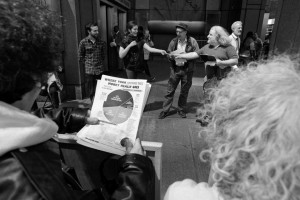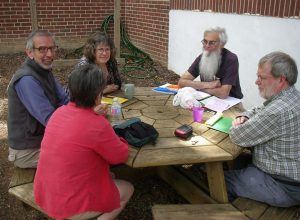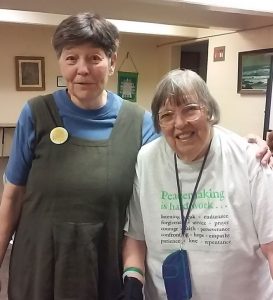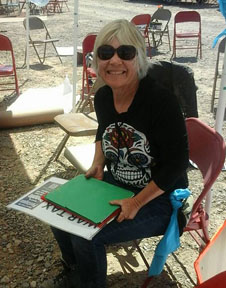More Than a Paycheck,
REFUSING to PAY for WAR
July-June 2016
Contents
- 45 Years of Alternative Fund Grants
- From NWTRCC Blog By Erica Weiland
- Fight for Human Rights Here and Now By Jason Rawn
- Counseling Notes Highlights of a WTR Q & A • IRS to Taxpayer: “Don’t Try to File in Person.”
- Many Thanks to everyone who supports NWTRCC with their volunteer time or financial donations and to the following groups for recent donations
- Network List Updates
- International Seeking NWTRCC Rep • Spanish Call to Resist and Redirect
- War Tax Resistance Ideas and Actions Gather in New England • Nonviolence Action Week • WTR Organizing and Income Tax Day • Shut Down Creech • Upcoming Events
- NWTRCC News May NWTRCC Gathering
- PROFILE Tax Testimony
By Margaret Weitzmann
Click here to download a PDF of the June/July issue
45 Years of Alternative Fund Grants
In order that we may offer our fellow citizens an alternative by which their tax monies may be directed to the sustainment of life rather than its destruction, the PEOPLE’S LIFE FUND is established.
Thus read the announcement of the founding of the New York City alternative fund in the August 1971 issue of Tax Talk, published by War Tax Resistance, the Vietnam War-era national organization that preceded NWTRCC. In the October issue of that year, Tax Talk included a page on Alternative Funds, explaining that “These are Funds whereby war tax resisters are pooling the money they have refused to give to the government. The money is rechanneled to local community groups.”
Of the 16 groups listed, two of those funds are active today under the same name: Northern California People’s Life Fund and New York City People’s Life Fund. The New England War Tax Resistance Fund dates their founding to 1969, although it was started under a different name. By late 1972 there were as many as 55 alternative funds around the country, and Tax Talk editors expressed the hope that the Funds “can be the political and moral force that will bring our government to a change of priorities.”
Today there are 11 funds in the NWTRCC network, but other sorts of alternative economic systems, like local currencies, time banks, freecycling, etc. (many described in our Practical #5, Low Income/Simple Living), have developed over these decades. Our Funds should be seen as a part of that network also. NWTRCC is also re-emphasizing the redirection side of our refusal to pay for war with the “Divest from the Pentagon, Invest in People” campaign.
This year more than $44,000 was “invested in people” by seven of our alternative funds, an amount multiplied exponentially by hundreds of individual redirections around the country.
Northern California People’s Life Fund granted $20,000 in resisted war taxes to local community organizations at a potluck and celebration on April 19 at the Berkeley Fellowship of Unitarian Universalists. Grants were given to 16 groups including BAYAN-USA, Berkeley Food Pantry, East Point Peace Academy, Indigenous People’s Day Committee, Oakland Emiliano Zapata Street Academy, Prison Radio, Veteran Artists, and Young Workers United.
 New York City PLF announced grants to four groups during a vigil on April 18, in front of IRS offices in Manhattan. A total of $2,000 was given to four groups: Not an Alternative, an art and activism collective; BK Rot composting operation; The New Sanctuary Coalition of New York City supporting those resisting detention and deportation; and, The Peace Poets music and poetry collective. Photo by Ed Hedemann.
New York City PLF announced grants to four groups during a vigil on April 18, in front of IRS offices in Manhattan. A total of $2,000 was given to four groups: Not an Alternative, an art and activism collective; BK Rot composting operation; The New Sanctuary Coalition of New York City supporting those resisting detention and deportation; and, The Peace Poets music and poetry collective. Photo by Ed Hedemann.
New England WTR was a cosponsor of a rally on a snowy and cold April 4 to protest General Electric, which is moving its headquarters to Boston tax-free. To the group of about 100 hearty activists, Mary Regan announced the alternative fund grants totaling $6,000 to local groups. She was surprised to be quoted in the Boston Business Journal: “Mary Regan of the group New England Tax Resistance, who told the Business Journal they believed that the $145 million in incentives, as well as the free rent that may be in the offing for GE, is money that should go toward public schools, public transportation and affordable housing, among other items they said were more deserving.”
Southern California War Tax Alternative Fund (founded in 1979) held a press conference on April 15 in front of the San Diego Public Library and announced grants of $6,000 “from the Pentagon” to Amikas’ “Homeless to Housed” program, Peace Resource Center of San Diego, Alternatives to Violence/Los Angeles, Tri-Valley CAREs, Nevada Desert Experience, and 9to5 Working Women/LA.
Oregon Community of War Tax Resisters, Portland, held their public redirection ceremony on April 19 at Augustana Lutheran Church’s Community Room. They pool their individual resisted taxes and ended up giving over $6,000 to six local groups, including Books to Prisoners, Food Not Bombs, and the Returning Vets Project.
Taxes for Peace Not War! announced the redirection of $660 by individual resisters at their downtown Eugene, Oregon, tax day rally. Groups receiving grants included 350.org, Stand for Children, the local chapter of the NAACP, and Occupy Medical.
Conscience and Military Tax Campaign Escrow Account split $4,000 evenly among eight groups: El Refugio Ministries and Alterna Community in Georgia for work on immigrant issues; Maine War Tax Resistance Resource Center; Peacebuilders Camp at Koinonia Farm in Americus, Georgia; Carolinas Human Rights Organizing Conference 2016 to be held in Asheville, North Carolina; Circle of Mercy Immigration Mission Group and community partners in Asheville; First Friends New Jersey and New York for support to immigrant detainees; and, Quaker House in Fayetteville, a safe space for Fort Bragg military personnel.
Tax day reports and photos are on our website, and we’ll run more in the next issue.
Fight for Human Rights Here and Now
By Jason Rawn
“They can’t knock you off the face of the Earth if other people know of your existence,” Cheri Honkala of the Poor People’s Economic Human Rights Campaign (PPEHRC) explained to attendees at the May War Tax Resistance Gathering. She and Galen Tyler had just guided us on a “Poverty Reality Tour” (they do 2 or 3 each week) through Philadelphia’s impoverished Kensington neighborhood, much of which is located right under the El tracks. Garbage swirls in the wind in this highly polluted part of town, where you can buy crack-smoking gear in any of the stores.
With “somebody on every single block” of Kensington and over 150 affiliates throughout the U.S., PPEHRC is committed to “uniting the poor as the leadership base for a broad movement to abolish poverty everywhere and forever.” They address at the grassroots level numerous systemic human rights violations, including the rights to housing, healthcare, a living wage job, education, and food, all codified by the Universal Declaration of Human Rights. According to the PPEHRC’s website:
The founding creed of the United States of America, which asserts our rights to Life, Liberty, and the Pursuit of Happiness, inspired the formulation of these rights. Our government signed the Universal Declaration of Human Rights in 1948; its full implementation would mean that our country would be living the true meaning of its creed. This American Dream is possible because our country is the richest and most powerful in the world.
Like the Kellogg-Briand Pact of 1928, which outlawed war, the Declaration seems to have been disregarded or intentionally brushed aside. But in an age where the gap in income inequality is growing ever wider as war profiteers deepen and expand the reaches of their omnicidal business, more and more of us are looking at how our common wealth could be more wisely invested to alleviate rather than cause exponential suffering.
PPEHRC does not operate as a charity. Rather, says Honkala, “We are funding, on our soil, our new, emerging freedom fighters, or missionaries, or whatever you like to call them.” As a movement, they know the importance of following the money in order to know who they’re dealing with, who’s behind who they’re dealing with, who’s behind who’s behind who they’re dealing with, etc. They are wary of being waylaid by the “non-profit industrial complex,” the Democratic Party, and other entities and ideologies that maintain the status quo. They seek long-term, effective partnerships with dedicated activists.
The NWTRCC network, with its longtime work toward radical change through withholding and redirecting war taxes, is one such partner. Our newest initiative, “Divest from the Pentagon, Invest in People” seems like a perfect fit. Collaborating with such a vibrant, widespread movement could help increase the number of personal-scale WTRs, institutional divestment from war, identification as WTRs of those living under the taxable income level (the poor), and other perspectives and actions aimed at remaking the world by defunding militerrori$m.
The May NWTRCC meeting endorsed the PPEHRC’s 2016 March for Our Lives, which will take place in Philadelphia on July 25, opening day of the Democratic National Convention. The March’s organizers are “calling on the poor of all colors, generations, genders, and other divisive labels” to join them in the ongoing battle against poverty, because “the necessities of life should be considered a right.” Contact the NWTRCC office to march with our war tax resistance banner at the March. See march4ourlives2016.org for information on the march itself.
To learn more about the work of PPEHRC, contact them at 174 W. Diamond Street, Philadelphia, PA 19122, (215) 869-4753, economichumanrights.org.
Jason Rawn just completed a second term on the NWTRCC Administrative Committee. He lives in Maine when he is not traveling far and wide to protest U.S. militerrori$m.
From NWTRCC Blog
By Erica Weiland
At this month’s conference I saw us wrestle several times with the definition of war. There hasn’t been a declaration of war for the U.S. military in a long time. But we don’t need a declaration to see that what’s going on in Iraq, Syria, Yemen, and many other places is war. We even talked about whether our slogan “Divest from the Pentagon, Invest in People” should say “divest from war,” to really emphasize in plain language what is at stake.
As Coleman Smith pointed out to our almost all-white gathering this weekend, we won’t look credible if we tell folks in black communities that the only wars are overseas. Police brutality, mass incarceration, and institutionalized racism are manifestations of a war on black people in the U.S. (The “War on Drugs” is itself a series of attacks on people of color.) Plus, the militarization of the police is a direct result of militarism. The wars abroad have been coming home for a long time.
We saw another manifestation of domestic war on May 14, when we toured the Kensington neighborhood of Philadelphia. …This tour had a major impact on me. I look at the depths of the war on the poor in the US compared with the depths of the issues the U.S. government contributes to through war overseas, and I know once again that it would be impossible for me to pay taxes for that.
Read the complete blog at nwtrcc.org/2016/05/25/which-wars-are-we-resisting.
Counseling Notes:
Highlights of a WTR Q & A
At the May WTR Gathering we were lucky to be in the home territory of NWTRCC’s legal advisor Peter Goldberger. He offered a Q & A session at the end of the gathering, and these were some of the topics that came up. These are not direct quotes but a synopsis of comments.
- Peter started off by saying that he thinks in general he’s getting fewer referrals and that probably has to do with Congress starving the IRS, which has to rely on automated collection. Thirty years ago there were more agents on people’s cases, and collection was more likely.
- The IRS has automated the Transcript of Account, which you can order online. Among other things, the transcript shows dates of assessment, which is useful if you want to know when the 10-year statute of limitations on collection expires. Asking for a transcript will not trigger any new actions against you.
- One person said he got a letter saying that they closed his file. Peter says for some reason either a human or a computer decided that he is just plain uncollectible. He might be costing more to try to collect from than he’s worth. Sometimes they will try to collect anyway, but that might be to frighten others into complying.
- Asked about anything new on the Supreme Court Hobby Lobby decision (see Aug/Sept 2015 newsletter) that might support a peace tax case or accommodation to war tax resisters, Peter was waiting to see what the Supreme Court does with cases in front of them challenging Obamacare rules. The next day, May 16, Peter sent an email to NWTRCC saying, “The Supreme Court this morning punted the pending Affordable Care Act/Religious Freedom Restoration Act (RFRA) cases back to the lower courts for further consideration of certain refinements and clarifications of the positions of the parties as articulated before the Supreme Court. So there will not be another major RFRA case this year, and the Hobby Lobby precedent will therefore not be reaffirmed, cut back on, or clarified, as I had anticipated it would be.” At our meeting he added that RFRA has to be used defensively. In the tax context, there are two statutes that prevent people from suing the IRS. Church groups can sue for their exemption but for taxpayers it’s not the same. Where an individual tries to sue the IRS, the cases won’t go forward. We can argue a case against the IRS based on Hobby Lobby when some enforcement is brought against a person who could and would have complied if the Peace Tax Fund was in place.
- The IRS won’t accept a tax return if it is not signed. It will get sent back to you and then you get a late penalty.
- Criminal prosecutions in the last few years tended to be of people who did some evasion or something we would not recommend. The more open, consistent and transparent people are the better they will do. The more they are seduced by anti-government rhetoric, hiding things, putting property in other people’s names, labeling things other than what they are — in the end it hurts.
IRS to Taxpayer: “Don’t try to file in person”
One resister at our gathering reported that she is having trouble filing her tax return. Because the IRS has been on her case, she wants to file in person and get the form stamped as received, but the IRS office in Philadelphia will no longer let people in to do this. Something changed in the last year, and when she calls she gets the run around. Are there other similar experiences from others around the country?
Many Thanks
We are very grateful to these alternative funds and WTR groups for their redirections and Affiliate dues:
CMTC Escrow Account
Madison Area Alternative Fund
Northern California People’s Life Fund
Southern California War Tax Alternative Fund
Voices for Creative Nonviolence
Western Washington Fellowship of Reconciliation
Network List Updates
The Network List of Affiliates, Area Contacts, Counselors, and Alternative Funds is updated and online at nwtrcc.org, or contact the NWTRCC office (nwtrcc@nwtrcc.org or (800) 269-7464) if you would like a printed list by mail.
Advertise to Activists! See the advertising rates for this newsletter or contact the editor at (800) 269‒7464.
INTERNATIONAL
Seeking NWTRCC Rep
 The International Peace Bureau, based in Geneva, Switzerland, and the key sponsor of the Global Day of Action on Military Spending, is holding a World Congress on Military and Social Spending in Berlin, Germany from September 30 to October 3, 2016. Anyone can attend.
The International Peace Bureau, based in Geneva, Switzerland, and the key sponsor of the Global Day of Action on Military Spending, is holding a World Congress on Military and Social Spending in Berlin, Germany from September 30 to October 3, 2016. Anyone can attend.
Groups that have been involved in the International Conferences on War Tax Resistance and Peace Tax Campaigns are communicating about attending the Congress and bringing our activities to this wider group. The WTR/PTC network has not held a conference in a few years and plans for the next one are sketchy. NWTRCC decided at the May 15 business meeting to send a representative to the Congress this fall.
War tax resisters who are interested in applying to be the NWTRCC rep should send a letter stating their interest and a brief paragraph about their involvement in NWTRCC or war tax resistance organizing. We are looking for a rep who: will be willing to present in a workshop or panel on WTR in the U.S. if such becomes available; take NWTRCC materials for a table; write a report for this newsletter; and, submit a report in writing or in person for the next NWTRCC gathering in November.
Please send your letter of application (1 page is probably plenty) by email to nwtrcc@nwtrcc.org or to NWTRCC, PO Box 150553, Brooklyn, NY 11215. Application deadline is July 15. Applicants should understand that we have a maximum of $1,500 to fund the travel and housing and conference costs. They will be responsible to search for affordable flights and housing options within the funding restraints.
Spanish Call to Resist and Redirect
By David Gross
The Spanish newspaper Diagonal, published an article on war tax resistance on April 28, in which they encourage people to withhold their war taxes and redirect them — to Diagonal. It was a sort of a pledge drive for the paper as well as being a call to WTR. I thought this was a clever way of aligning the fundraising interests of nonprofits and other such groups with the publicity and outreach interests of the WTR movement.
What if NWTRCC had a program where we would reach out to a group and offer to set up a website and other promotional material specifically for them that would help people to redirect their taxes to that particular group? They in turn would distribute this info to their contacts, encouraging resistance and redirection. It seems like a win-win: the group gets a fund-raising opportunity, we recruit more resisters and raise the profile of WTR, more money gets redistributed from the Pentagon.
David Gross is a resister, blogger (sniggle.net/TPL), and author who lives in San Luis Obispo, California. Send comments about this idea for our next newsletter.
War Tax Resistance Ideas and Actions
Gather in New England!
The next New England Gathering of War Tax Resisters and Supporters will be October 14-16, 2016, at Agape Community, Ware, Massachusetts. The focus will be building relationships with activists of other resistance movements. The hope is to build toward a larger conference in 2017 in conjunction with the Resistance Studies Initiative at UMASS Amherst. For more information, contact MaineWTR@gmail.com, or Emilie Hamilton, PO Box 164, Amherst, MA 01004, (413) 362-5885, emilie.hamilton@aol.com, about registrations.
Nonviolence Action Week
NWTRCC is an endorser of Campaign Nonviolence (CNV), a long-term movement for a culture of peace and nonviolence free from war, poverty, racism, environmental destruction and the epidemic of violence. The Campaign is sponsoring their third annual Action Week, September 18-25, 2016, with a goal of 500 actions in all 50 states and in nations around the world. At NWTRCC’s May 15 business meeting we agreed to call on the war tax resistance network to participate in this week by joining with an action in your community or planning your own. Find resources and listings for the week of actions at paceebene.org/programs/campaign-nonviolence, and visit nwtrcc.org for war tax resistance resources that you can use during that week. Email listings to nwtrcc@nwtrcc.org to post on our website.
WTR Organizing and Income Tax Day
By Glen Anderson, Olympia, Washington
Thoughts on more effective leafletting at the post office: People feel like they need their “space.” Many people are not comfortable with strangers approaching their open car windows. People will not receive our flyers if they do not feel safe. Therefore, when I have leafletted with WRL’s pie chart flyers at the post office’s drop box out in front, I’ve stood 20 feet ahead of the mailbox, so people are free to roll down their car windows if they choose to, but — if they are not interested — they can feel safe and leave the windows rolled up until they actually reach the post office. If someone rolls down their window, I know they are receptive and will accept my flyer. I get a good success rate by standing 20 feet ahead and letting people choose whether to be receptive.
Then when I’ve offered the flyer, I’ve said something like, “You probably have better sense about how to spend our tax dollars than Congress does.” This welcomes them in to accepting the flyer and its message, and it compliments on their good sense. Most people think Congress is stupid, corrupt and dysfunctional. A comment such as what I offer invites people to realize that they are on the same side as this peace supporter.
Secondly, by the time the deadline day arrives, people are stressed and eager to be done with the nasty annual task, so they are probably not mentally open to engaging with new ideas. They just want to mail the envelope and get on with the non-IRS parts of their lives. For those reasons, on that deadline day, asking them to consider radically new ideas and repent of what they have just done would be rather ineffective, since they just want to be done with it.
I think the whole WTR movement would be more effective if we could reach people a few months earlier while they are just starting to think about income tax and might possibly consider WTR. Waiting until Income Tax Day for major outreach is simply too late to be effective, because on Income Tax Day people are emotionally shutting down rather than opening up.
Shut Down Creech
By Anne Barron
Creech Air Force Base is the main drone training and operations center for the U.S. military drone program. It lies north of Las Vegas in a valley between tall mountains. From March 27 through April 2, I joined other Shut Down Creech activists at Camp Justice, just opposite the base. I got to enjoy incredible sunsets and snowy peaks. Later, when I found out that the base location was chosen because the terrain is strikingly similar to Afghanistan, I got depressed.
High winds at the start made for several tent disasters at the temporary Camp Justice as well as forcing the shut-down of drone flights for one day. Since our purpose was to slow down the war machine, this was very helpful.
Twenty-five people were arrested for refusing to yield to traffic entering the base over two days. We had a really complex discussion around the question of whether to pay fines during a nonviolence teach-in, since fines go to fund police departments and are too often a strong revenue generator.
The Las Vegas police facing off against the activists seemed more like a paramilitary troops. Shouting the Marine “hoorah” cry in unison, they stomped over to face off the children and angels acting out the morning drama. Since base operations had been altered to offset our stalling actions, the excessive deployment of police seemed pointless — although it gave the residents of Las Vegas a breather from excessive policing. The militarization of our cities’ police needs our attention.
I brought war tax resistance information and found a lot of interest in one-on-one conversations. There were lots of questions and concerns about consequences and the IRS during a workshop session. In addition, I got many beeps from cars upon seeing my “Divest from the Pentagon; Invest in People” sign.
Were we successful? Enough so that I will be back next year with Veterans for Peace, CodePink, Nevada Desert Experience, and Voices for Creative Non-Violence.
Upcoming Events
Join war tax resisters or look for NWTRCC literature at any of these upcoming events. Please contact the NWTRCC office at (800) 269-7464, nwtrcc@nwtrcc.org, if you would like to table for NWTRCC or meet up with other resisters.
- Faithful Witness in a Time of Endless War · June 24-25, 2016 · Lansdale, Pennsylvania, peacecoalition.org/events
- People’s Justice and Peace Convention · July 15-17 · Cleveland, Ohio, counterrnc2016.org
- March for Our Lives · Monday, July 25, 3:00 pm · Philadelphia, Pennsylvania, march4ourlives2016.org
- Veterans For Peace 31st Annual Convention · August 11–15 · University California, Berkeley, vfpnationalconvention.org
- Shut Down School of the Americas Border Actions · Oct. 7-10 · US-Mexican Border, Nogalas, Arizona, soaw.org/border
- 2016 Maine Peace Walk: Stop the War$ on Mother Earth · Oct. 8-22 · Global Network Against Weapons & Nuclear Power in Space, PO Box 652, Brunswick, Maine 04011, (207) 443-9502, space4peace.org
NWTRCC News
May NWTRCC Gathering
Not All Talk
By Ruth Benn, NWTRCC Coordinator
 Lansdowne Friends Meeting and Lansdowne Friends School in Pennsylvania, hosted NWTRCC’s May 13-15 war tax resistance gathering, which was co-sponsored by Brandywine Peace Community and the Peace Center of Delaware County. There were about 30 attendees — 20 from around the country and 10 local. NWTRCC’s Administrative Committee met during the day on Friday, and one of the 5th/6th grade teachers asked for someone to give a presentation about war tax resistance in her class that afternoon. Ari Rosenberg reported much interest and tough questions from the students.
Lansdowne Friends Meeting and Lansdowne Friends School in Pennsylvania, hosted NWTRCC’s May 13-15 war tax resistance gathering, which was co-sponsored by Brandywine Peace Community and the Peace Center of Delaware County. There were about 30 attendees — 20 from around the country and 10 local. NWTRCC’s Administrative Committee met during the day on Friday, and one of the 5th/6th grade teachers asked for someone to give a presentation about war tax resistance in her class that afternoon. Ari Rosenberg reported much interest and tough questions from the students.Lansdowne Meeting and Chester Quarter members provided housing for attendees, which was great and greatly appreciated. Lansdowne Meeting clerk and WTR Paul Sheldon (pictured above left in workshop ) was our primary host, and Fran Sheldon arranged an excellent potluck dinner Friday from Meeting members and great food throughout the weekend. Thanks to them both.
On Friday evening, another area host, Bob Smith of Brandywine Peace Community, gave out-of-towners an overview of local peace work, especially the protests at the drone warfare center at Horsham Air Guard Station and newer protests against the Vanguard Group, which invests in weapons, prisons and guns, and buys good publicity by donations to UPenn.
Maine WTR Jason Rawn had just returned from three months in Okinawa, Japan, and Jeju Island, Korea, protesting U.S. bases. He showed photos from his trip, told stories of the amazing activists and long-term actions in both places, and how he connected the “divest from the Pentagon” message with actions there.
The tax season trial campaign, “Divest from the Pentagon, Invest in People,” was a focus for workshop sessions during the weekend. Friday evening’s program included reports from around the country, many of which are posted on our website under the “Programs & Events” menu. Redirection reports are in this newsletter. Anne Barron in San Diego and Ginny Schneider in Maine worked especially hard to make connections with more groups and plant the idea of war tax resistance everywhere from contra dance venues in Maine to the NAACP in San Diego. At our November meeting those two locations plus a few others had been selected as pilot projects for Tax Season Days of Action under the Divest/Invest theme. The other locations had less to report, but this trial year reminded us that building new partnerships is a long and time-consuming project and that our local organizers need a lot of support with material resources and financial help to grow WTR outreach and identity. Everyone in attendance endorsed the proposal to carry on with this effort into the 2017 tax season; the suggestion to change the phrase to “divest from war” rather than “Pentagon” is under consideration.
Filmmakers Paula Rogge and Jerry Chernow from Madison, Wisconsin, used a workshop session to show clips from interviews they have been conducting over the last couple years at NWTRCC gatherings and other war tax resistance local or regional events. The footage was well-received, and some clips will begin to appear on the NWTRCC website over the coming months. Eventually a longer film will be completed also.
The Saturday afternoon Poverty Reality Tour, which got us into Philadelphia, is described in the article starting on page 1. Thanks to Philadelphia host Ari Rosenberg for helping with the tour arrangements and the great dinner at Liberty Choice in North Philadelphia. She also secured donations from the local Food Not Bombs; we are always grateful for their work.
The Business of NWTRCC
The NWTR Coordinating Committee (CC) is the highest decision-making body of the organization and is made up of local representatives and everyone who attends the meetings in May and November. The May CC meeting is usually not as business heavy as the November meeting, but this time we had six proposals and a fairly packed agenda. The group agreed by consensus to extend the paid ad campaign into the fall; give a grant of $1,000 to the Maine WTR Resource Center as it revitalizes; fund production of a 4-page comic as an outreach tool; promote the Campaign Nonviolence Action Week (see page 4); create and fund a Field Organizer-type position to be advertised later this summer (watch our website for details); and send a representative to the World Congress on Military and Social Spending in Berlin, Germany (see page 3). We endorsed a number of upcoming conferences and actions, most of which are listed under “Upcoming Events” on page 3.
One annual and important agenda item at our May meetings is the rotation of members off and onto the Administrative Committee, the small group that keeps a focus on NWTRCC business and consultant work between the two CC meetings each year. Nominations are sought in the months before the May meeting and others can be nominated at the meeting itself. This year Ari Rosenberg (Philadelphia) and Jason Rawn (Maine) completed their terms, and a big thanks goes out to both for the extra time they gave to NWTRCC. Alternates Coleman Smith (North Carolina) and Bill Glassmire (Oregon) join Cathy Deppe (California) and Rachel Soltis (Arizona) as full members. Selected at this meeting as new alternates are Chrissy Kirchhoefer (St. Louis) and Sam Koplinka-Loehr (Philadelphia).
The location for our November 4-6, 2016, gathering is not decided as yet, so watch this newsletter and our website for details. However, mark your calendar now!
PROFILE
Tax Testimony
By Margaret Weitzmann

Courtesy of Margaret Weitzmann
A bit of history: On November 4, 1977, Islamic revolutionaries in Iran stormed the U.S. Embassy, launching the hostage crisis. On February 1, 1979, Ayatollah Khomeini became Iran’s premier. The deposed Shah bargained for asylum around Europe, the Mideast and Africa into the summer, when President Carter admitted him to the U.S.
In April 1979, two things happened: The U.S. broke off diplomatic relations with Iran. And, friends who just happened to be visiting a Navy Fleet massed in Miami witnessed what looked to be a decontamination drill on board one of the vessels. I jumped to the conclusion that Carter was about to solve the hostage crisis by attacking Iran.
Tax Day 1979 fell on Easter Sunday. My 1040 was calculated, ready to send. I’m not a devout anything. Suddenly I couldn’t write that check. Instead I dashed off a note saying in effect “No more war,” and enclosed that.
Carter didn’t send the Navy. I still believe it was a close call.
The IRS dunned me for a year, then garnisheed my wages (down to about $100) for three months. I kept on writing those notes. I was lucky: other people who wrote refusals on their 1040s during the Reagan years were slapped with heavy fines.
The next IRS levies were on bank accounts. I learned major banks also charge for IRS levies: $100 for a $300+ payment in HSBC’s case. I found a bank that doesn’t do that and switched.
Some funny things happened. In one telephone exchange with the IRS my contact said, “I don’t understand why you don’t just send in the check.” “Oh no,” I said, “you’ve got to come and get it.” She laughed. One year the IRS sent me a check for $800 in overpayment. I deposited it, but two months later got honest and reported it must be their mistake. “You’re right,” they admitted, “$800 please.”
I was audited in 1985 and was cleared, though the assessor discovered I was entering property taxes in two places. Another penalty.
For several years I managed to owe nothing, but when my retirement kicked in I was back to owing again. I work hard on donations, subsidize rent to tenants (Schedule E), published two unprofitable novels (Schedule C). All my investments now are in municipal bonds (tax free) and/or development banks. The IRS has twice paid themselves back out of my Social Security payments. I’ve owed anywhere from $120 to $350 for every year since 2012, so they keep dunning me. Yet, except for the Social Security deductions, they haven’t tried other ways to collect. I can’t help appreciating the civility they’ve shown me, despite what must be a big flag on my social security number.
Incidentally the New York Times Sunday Magazine that Easter, April 15, 1979, carried Joseph Campbell’s article, Earthrise: The Dawning of a New Spiritual Awareness. If you haven’t read it, go look it up.
Margaret Weitzmann lives in upstate New York and worked as a librarian while raising four children (“all radicals in different ways”). Her two sci-fi books, Down Jacket and A Door at Aulis might still be found online or at your local library.






